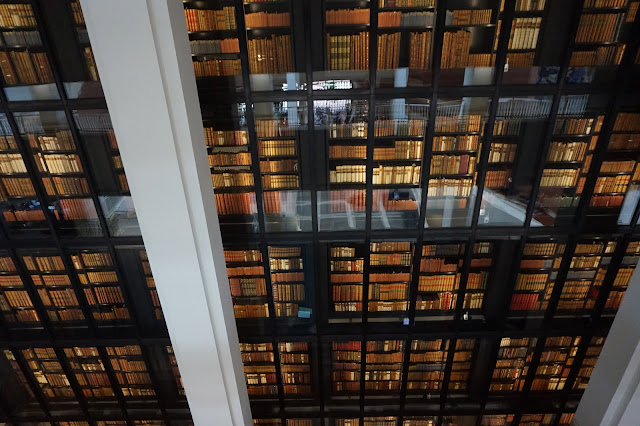Precious books and permission to access them! Wahoo!
I love the inscription at the top of the card. I am here to do research, but I know I will find inspiration and enjoyment. In fact, that has already begun! The library itself is just jaw-droppingly beautiful, and, among other things, it has a very large exhibition room where anyone can wander in and see treasures from many fields: music, science, literature, geography, etc. I'll give a visual tour of the library and exhibitions first and then zoom in on what it was the drew me here very specifically.
 |
| The Terrace Restaurant |
 |
| God is Our Refuge (Mozart, age 9) |
 |
| Earliest known printed world map to show America (an extension of Asia) |
 |
| Jane Austen's writing desk with a letter to her brother Frank on top |
 |
| Some of the Angria juvenilia by Charlotte Bronte |
 |
| The Gondal Poems by Emily Bronte |
And above we have the philatelic collections, and below we have books, books, BOOKS!!!
OK, so certainly all of the above was way more than enough to draw me here! But I am actually traveling on sabbatical to study The Sorcerer Mathematicians of the Renaissance, and I was here for Dee, John Dee.
I wish I could show pictures here of this scroll unrolled. I may be able to in a later post; I just need to write the permissions department at the library and get an OK first. It contains the genealogies of John Dee and Queen Elizabeth I (hence their relationship to each other, which Dee was trying to promote as he sought position at court), and these lines of descent go all the way back to King Arthur and his father King Uther Pendragon! The scroll is filled with beautiful calligraphy, paintings of heraldic shields, and a self-portrait by Dee (thought to be the only extant contemporary likeness of him). I touched and handled this scroll, hand-drawn in the 16th century by John Dee. I know I'm repeating myself, but I can't stress strongly enough how surprised I was to be able to access this scroll. Dee has become a very popular cult/occult figure, and this scroll is well over 400 years old. It just goes to show you what kinds of doors can open to a math professor on sabbatical, and I am humbled and privileged in this!
*****
After that I almost can't write about anything else, but later that evening I also went to the British Museum. Here too the focus was Dee. I had already seen Dee's items on display at the Royal College of Physicians four years ago, but I wanted to see them in their usual home - different display, might hit me differently, who knows. I'm going to wait to share pictures of that display, but I will share other images of and from the British Museum.
 |
| King Nebuchadnezzar II's Babylon |
 |
| Mummies |
I do always gravitate to two items when I am at the British Museum: The Rosetta Stone and the Elgin Marbles. In the first picture below I'm actually wearing a shirt that I just bought that has the Rosetta Stone on it, but the lighting is such that you'll just have to take my word for it. (I don't normally buy souvenirs, but for this I made an exception! It'll be a good shirt to wear in my classroom when I'm teaching multiplication with Egyptian numerals!)
OK, I know some of you do read Greek. How ya doin' with the lower script in the image below?
Elgin Marbles:
Why did I not realize that the actual original of the Royal Game of Ur would be on display? This was another moment of nearly fainting.
The Babylonian tablet below contains directions for the game - the earliest known set of directions for a board game - and it was museum curator Dr. Irving Finkel who painstakingly translated the directions and therefore revived this once universal game!
In the following YouTube Dr. Finkel talks a little bit about this discovery and translation. He is a hero of mine, and I was keeping my eyes open hoping to see him at the British Museum! (But then I really would have fainted - though only after getting a selfie with him!)
And may I just say, DR. FINKEL, SIR, YOU ROCK!!!!
OK, I don't know where to go from there, so I'll stop. That was an awful lot of excitement in one day! I'm posting this on my fourth day, and I have no idea how I'm going to keep up with this! There is just too much awesome stuff!




























No comments:
Post a Comment